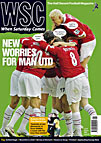 Chester v Wrexham, a threat to national security? Mark Howell investigates
Chester v Wrexham, a threat to national security? Mark Howell investigates
Five years ago, Chester City were struggling at the foot of the Conference, and had American despot Terry Smith picking the team. City fans were running an official boycott, standing right throughout the winter months in shocking conditions outside the Deva Stadium, 12 hours a day, six days a week. Eight miles up the A483, that season our arch rivals Wrexham were rebuilding their ground and a team that would eventually be promoted to what is now League One the following year.
Chester were teetering on the brink of collapse when Stephen Vaughan bought the club in late 2001. Fast forward to November 2005 and manager Keith Curle’s side are firmly in the hunt for a League Two play-off spot, sitting above Wrexham in the League for the first time in 13 years. The first league derby in 12 years is due to take place at the Deva Stadium, scheduled for 7.45pm on December 28. This is a massive fixture for both sides, a guaranteed full house, and the one that everybody had looked forward to as soon as the Robins’ relegation was confirmed last year. “Everybody” meaning both sets of supporters, red and blue.
Having had more than four months to lodge a complaint or to discuss the match date, it was announced on November 10 that the game would now kick off at noon on December 28, the first day of the sales and not a bank holiday. The reason cited by Cheshire Police and the “Safety Advisory Group” was public safety. They would not allow the game to be played after dark, that it would be better to play in the middle of the busiest shopping day of the year. This at a stadium whose only entrance and exit points are on an extremely busy retail park in a city built around shops and tourism.
The last match between the two clubs was an LDV game last season, which attracted more than 5,000 to Chester and was policed in such a way that there was no trouble at the ground. The only minor incidents were out of town with only five arrests, which is fewer than at the average Chester race meeting. The police kept the troublemakers apart and did so in a way that was praised by fans and the host club for its manner, its efficiency and its fair financial cost to City.
The normal fans of both clubs are understandably outraged. They feel that the police are only leaving themselves open to further criticism if there is trouble. It is a sure bet that both clubs’ hooligan elements will turn out for the match and then have all day to drink and do what they want in and around the city centre. What now for the high percentage of supporters from both clubs who cannot attend the match? The Chester and Wrexham area has a lot of retail, financial and manufacturing employment, meaning that to many time off at this peak period is simply not an option. A lot of the Chester fans are season-ticket holders who have no comeback or refund. The change of kick-off time will certainly cost the Blues the full house that they badly need financially and in pure fan terms the atmosphere at noon will never come near to a floodlit derby.
And what of the wider implications? The Football League said it “is not happy with this… especially with the precedent it sets”. It offered alternative dates, which the authorities dismissed. The worry must be that if the authorities deem fit for a 6,000-capacity League Two fixture to be played during the working day, who will be next? What of Manchester or London derbies? West Yorkshire Police are already causing untold headaches for Hull City, not allowing supporters to travel independently to the match with Leeds. Hull are set to refuse their ticket allocation, causing normal City supporters to brave Leeds sections if they want to see their team in action.
Although football fans continue to make strides, through trusts, independent supporters’ associations and anti-racism initiatives, the attitudes and actions of some authorities and police forces remain rooted firmly in the Seventies. Progress, anyone?
From WSC 227 January 2006. What was happening this month